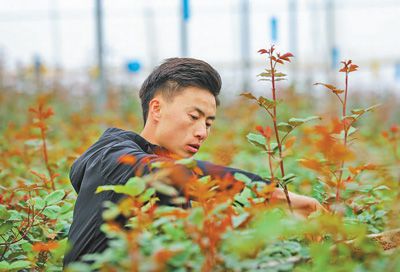Young Chinese man’s burgeoning rose planting business brings fellow villagers along road to common prosperity
Liu Kaibin, a young entrepreneur from Qujing city, southwest China's Yunnan province, runs a thriving rose planting business, providing many employment opportunities for his fellow villagers and helping to thicken their pockets.

Liu Kaibin works in his rose plantation. (Photo/People's Daily)
After graduating from university in 2015, Liu, born and raised in Duqibao village of Majie town, Luliang county, Yunnan province decided to return to his hometown and started his own horticultural business.
"Since Kunming, capital city of Yunnan, was filled with talented people, I might not have had a competitive edge there. I was more confident about running a business in my hometown," Liu recalled. "Rural areas are full of various resources, and I believed that they were yet to be tapped," Liu said, who had to work to further persuade his parents when they raised doubts about their son’s business prospect.
Unfortunately, Liu did face some setbacks during the first year of his experiment in entrepreneurship. Due to the subpar quality of the flowers he cultivated and his poor planting techniques, the sales performance of his company was rather dismal. After Liu spent half a year conducting a survey and investigation, the results showed that his most daunting challenges proved to be making improvements to his marketing and planting techniques.
After learning about his shortcomings, Liu visited a flower industrial park in the Shilin county of Yunnan, which is home to large tracts of roses grown in a wide array of colors. “Since traditional rose varieties were saturating the market, planting roses in niche colors such as orange, purple and blue might be more profitable,” Liu thought to himself, having purchased some 50,000 rose seedlings to continue his experiment.
Liu became even more meticulous about his business this time and participated in the whole process of rose cultivation. His efforts paid off when he earned up to 30,000 yuan ($4,665) per mu (about 0.06 hectares) in 2016, with each of his niche-colored roses selling for 7-8 yuan compared with only 1 yuan per stem for those roses in the more traditional colors. Apart from paying off all the debts resulting from his previous poor business operations, Liu also spent his earnings on upgrading his low-end greenhouses into automated ones.
In a bid to reduce his own risks in business operations, Liu signed advanced purchasing agreements with buyers from other provinces. Today, nearly 70 percent of his roses have been ordered for advance sale, and more than 200 wholesalers and 2,000 florists have established stable business contacts with Liu. The remaining 30 percent of the roses are being used to explore new markets.
“With these foreseeable profits, we can focus on planting,” Liu explained.
Starting from 2017, more and more villagers from Majie town started to join the ranks of rose cultivators under Liu’s guidance. One of these villagers is Li Ming who pocketed over 100,000 yuan in his first year of work and expanded his planting area on a yearly basis to reach 20 mu as of this year.
Liu’s rose planting cooperative now covers a planting area of more than 500 mu, providing technical assistance to more than 30 growers and providing jobs for more than 200 villagers.
With such achievements, Liu started to push for a transformation of his company – investors could now fund the construction of greenhouses, while his team mainly took on responsibilities for providing field management, flower picking, logistics, sales and other operational services.
"What we were engaged in during the past was agricultural planting, but in the future we hope to provide a greater amount of agricultural social services," Liu explained.
Photos
Related Stories
Copyright © 2021 People's Daily Online. All Rights Reserved.










